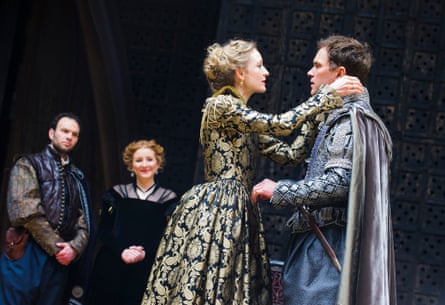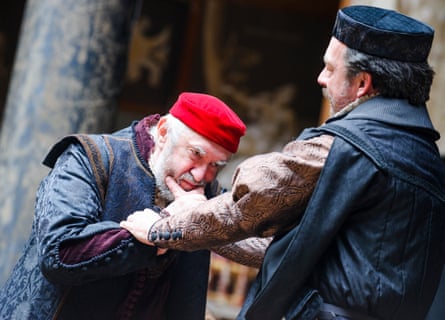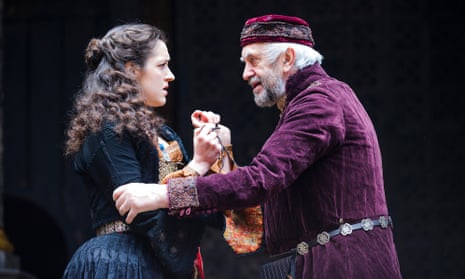So accustomed have we become to modern reinterpretations of Shakespeare – Julius Caesar set in a women’s prison, Macbeth as a chef, Hamlet as a hipster – that it feels like something of a novelty to see an old school production with the cast in doublets and lace in which, from the opening scene onwards, there is always someone upstage left bothering a lute.
The Merchant of Venice, playing this week as part of the Lincoln Center festival and on loan from the Globe Theatre in London, is the very best of what a traditional production can be, throwing light on the text but with enough new touches to preserve against boredom. It is also, as with every production of this particular play, a barometer for the anxieties of the times. Through subtle direction and inflection, the shading around Shylock, Antonio and even Portia is recalibrated to provoke or withhold sympathy in line with modern definitions of victimhood.
When the Globe opened in 1997, its project was to render not just the text of Shakespeare’s plays but the tone and ambience of Elizabethan drama as realistically as fire safety codes allowed. What this means, for today’s audience, is walking into the theatre to a drum-banging, raucous chorus of players, leaping across the stage and running up and down the aisles inciting the audience to clap their hands.

Perhaps this works better in the Globe itself, where the Elizabethan-style building helps ease the audience into role. In the modern Lincoln Centre auditorium, it brought on a slightly frozen self-consciousness among those trying to settle in their seats while being shouted at by men in masks. (I confess, I am a killjoy about hand clapping or any other form or forced jollity. It’s possible some people enjoyed it.)
A better iteration of this approach came in act two, when Launcelot Gobbo, played with cockney brilliance by Stefan Adegbola, waded into the crowd and pulled out two people blinking on stage to assist him, pantomime-style, in the fight between his “fiend” and his “conscience”. This is how audience participation is supposed to look, funny, spontaneous and genuinely interactive in a way that pushed the idea of the play’s populism without being silly.
The lighter moments in Merchant have to be fought for – it is a dark, violent play – and the other comic set piece, Portia’s disastrous set of suitors musing gameshow style over how to win her hand, was wrung for every laugh it could get.
Otherwise, the staging, with minimal scenery and dim lighting, rendered the darkness of the times, then and now, with grim accuracy. The threat of mob violence, the thuggish actions of men who conceal their faces, and the casual cruelty of those who have towards those who have not was intimated more than spelled out and the more powerful for that.

Portia, for example, was played by Rachel Pickup with a kind of mean girl snap, her condescension towards Shylock’s daughter instantly recognisable. Likewise Dominic Mafham as Antonio played the role less bullishly than with the entrenched, languorous contempt of the entitled.
Great English stage actors can go overboard in Shakespeare – most famously Olivier gurning his way through Othello, although Ian McKellen’s last King Lear gave him a run for his money. I had half wondered if Jonathan Pryce as Shylock would go this way. He didn’t. Instead, his Shylock, stoop-shouldered and by turns cowering and full of a frothing bravado, rescued the role from being a “comment” on race, and returned it to the story of a battered, angry and increasingly mad old man, pushed to savagery by the savagery around him. Sympathy for Shylock has waxed and waned over the centuries and he is now firmly regarded as a character more sinned against than sinning. In this production, in which he exchanged Yiddish asides with Jessica, his daughter, he was rendered as a complexly as I’ve seen.
There were some accommodations for modernity. The question of why Antonio would put himself out quite so fervently for Bassanio and vice versa is, today, never adequately explained by fraternal feeling and in this version, Antonio makes a vague pass at his friend, who brusquely rejects it. I wonder if there isn’t a way to make gay subtext slightly more subtextual.
In the same way, the end of the play felt overblown, rising to a shriek as Shylock’s forced conversion to Christianity was played out on stage while his heartbroken daughter sang a Hebrew prayer by his side. But these are quibbles. The effect of the play was as of a punch to the gut and the smell of fire from the torches lingered long after the end.

Comments (…)
Sign in or create your Guardian account to join the discussion